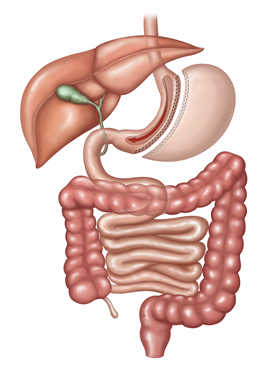Laparoscopic Sleeve Gastrectomy (Gastric Sleeve)
How does the Sleeve Gastrectomy work?
After removing around 80-85 percent of the stomach, the remaining “tube-like” stomach generates weight loss by restricting the amount of food that can be consumed. There is also a decrease in the hormones affecting satiety and hunger once the excess stomach is removed.
How is the Sleeve Gastrectomy performed?
The Sleeve Gastrectomy is performed laparoscopically through small incisions. We staple and vertically divide the stomach, creating a new “tube-like” stomach. The staple-line is reinforced to minimize complications. The procedure takes one to two hours to complete.

What are the advantages of the Sleeve Gastrectomy?
- Limits the amount of food the remaining stomach can hold
- Rapid and significant weight loss, 40% to 70% of excess body weight
- No re-routing of the intestines
- Short hospital stay
- Causes changes in gut hormones that suppress hunger and improve satiety
What are the disadvantages of the Sleeve Gastrectomy?
- Non-reversible procedure
- Possibility long-term vitamin deficiencies
What you will experience the day of surgery at

St. Vincent’s Medical Center
On the day of your procedure you will go to the surgery center. You are prepared for surgery and an IV will be put in place at this time. You will be transferred to the holding area to meet your surgeon, your anesthesiologist and OR staff taking care of you. In the OR you will be put asleep after inhaling oxygen enriched air via face mask by intravenously fast acting medication.
After surgery you will be transferred to the recovery room. If you have a history of sleep apnea you will receive extra monitoring at this time.
After you completely awake you may proceed to the nursing floor or to the intensive care unit. Placement in the ICU doesn’t mean that there is a surgical complication – it is usually for a patient who needs very close monitoring due to medical conditions that were present before surgery.
Pain after surgery is controlled by Patient Controlled Analgesia (PCA). This is a computerized pump that allows you to request and receive pain medication whenever you might want it. It is very safe and effective in controlling pain.
A swallow test is performed the next day after surgery. You will be asked to drink a small cup of clear liquid x-ray dye. This test helps us to confirm proper placement of the band.
After the swallow study you will be offered sugar free liquids and diet popsicles.
Discharge and follow-up
- Activity as tolerated. Exercise in encouraged, however, no heavy lifting or strenuous activity for four weeks.
- You may take a bath or shower.
- Abdominal binder for comfort as desired.
- You may remove the Steri-strips after 5 or 6 days.
- You may drive when you are no longer taking pain medication.
Medications
- Resume pre-surgery home medications as instructed by physician.
- Multivitamin twice a day (chewable or liquid).
- Nexium (prescription) or Prevacid (over the counter) for heartburn.
- Roxicet every four hours as needed (prescription) for pain.
Diet
- Drink a lot of water – at least 2 quarts (64 ounces) each day.
- Do not gulp. Take frequent (every 5 to 10 minutes) small sips.
- Clear liquids: Beef, chicken or vegetable broth.
- Diet drinks, such as Crystal Light.
- Sugar-free frozen fruit flavored ice pops, such as Popsicles.
- Sugar-free gelatin, such as Jell-O.
- Flavored waters.
- You may have caffeinated diet drinks sparingly (limit to two 8 ounce servings per day).
- Avoid carbonated beverages.
When to Notify Physician
- Notify your physician if your temperature exceeds 101° F.
- Notify your physician if you experience signs of infection which include redness or drainage from incision site, chills or pain not controlled by pain medications.
- Notify your physician if you have pain and swelling in your leg or calf, if you have chest pain, palpitations or shortness of breath.
- Notify your physician if you are constantly nauseated and/or you vomit for prolong period of time; if you cannot keep down your medications including vitamins.
Additional Instructions may be given based on individual circumstances.
Call 904-389-8871 to schedule follow-up appointment.
If you are Diabetic and seen by Endocrinology associates, please call their office.
This information is selective and does not include all possible side effects and complications resulting from this medical condition, diagnostic procedure or treatment. Potential complications should be discussed in more detail with your physician.

